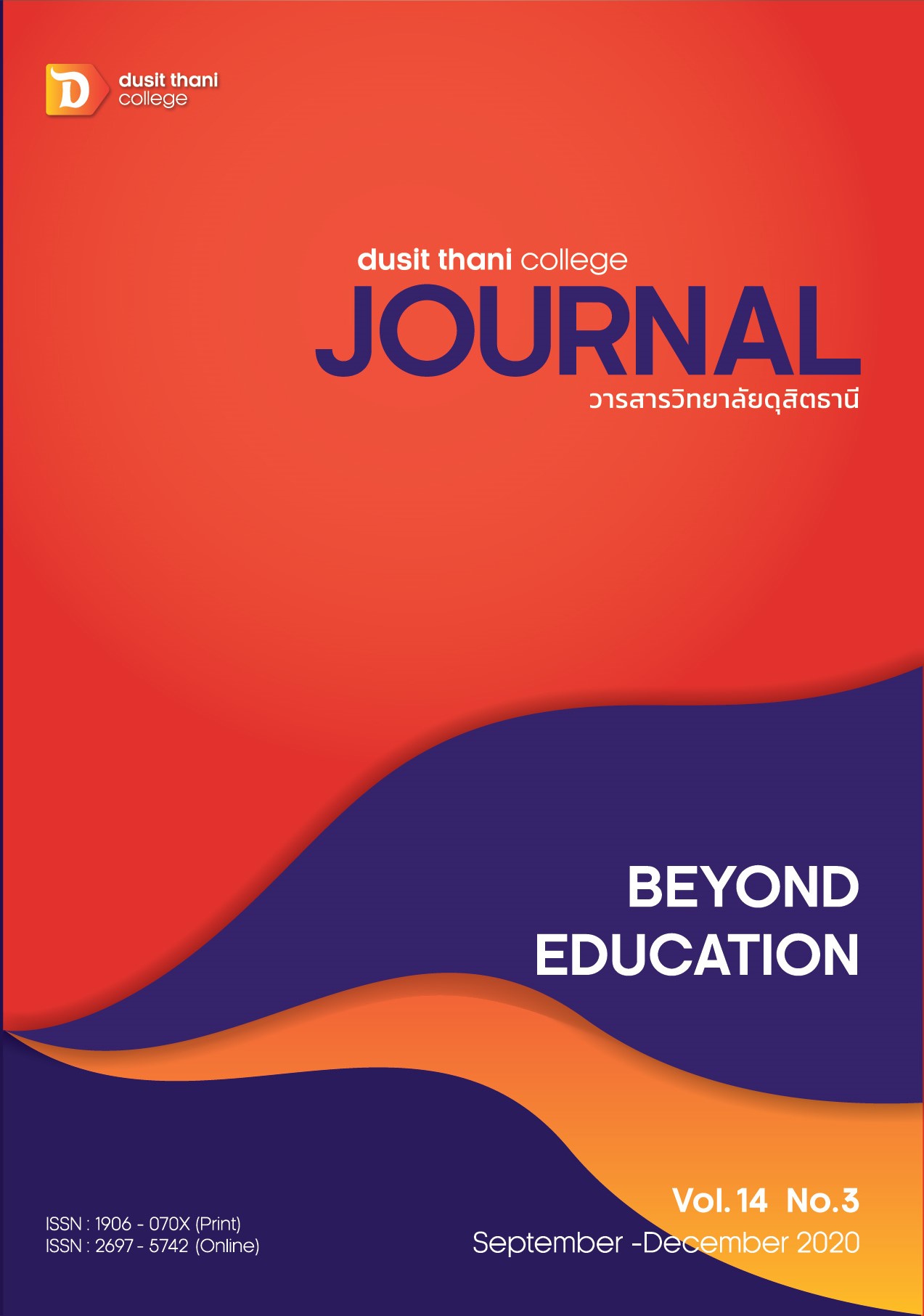The Environmental Management Approach for Small in Kon Chang Trat Province
Main Article Content
Abstract
The objectives of this research are 1.to identify the problem of the environmental management for small hotels in Koh Chang and 2. to suggest an approach based on a concept of Balanced Scorecard for the environmental management of small hotels in Koh Chang.This was a qualitative research which included one month of area observation and interview 36 related stakeholders. There were 13 community officers, 13 residents and 10 small hotel personnel. The semi-structured interview is used as the data collecting tool. For data analysis process was presented via content analysis with methodological triangulation.
The research data found 1.There were three problems of the environmental management which were wastewater treatment , waste management and management of sufficient fresh water. The researcher suggests an approach based on a concept of Balanced Scorecard for the environmental management of small hotels in Koh Chang as follows: 1. To Use the model of household environmental management and the community environmental management network instead of the Government model which lack of the long term plan. 2. To implement an On Site Treatment management model and 3. To create the strategy performance management tool, based on the concept of Balanced Scorecard . There are four dimensions: the effectiveness dimension, the internal process dimension, learning dimension and the stakeholder dimension in order to encouraging the small hotels to join the community network and activity to develop the onsite and the community environment management effectiveness in the Community Based Tourism (CBT) area in Koh Chang.
Article Details
Article Screening Policy
- All research and academic articles to be published must be considered and screened by three peer reviews in the relevant field / article.
- All articles, texts, illustrations and tables published in the journal are the personal opinions of the authors. Editors don't always have to agree. And no responsibility whatsoever is the sole responsibility of the author.
- The articles to be published must never be published. Where did you first publish? And not in the consideration of other journals If the audit found that there has been a duplicate publication It is the sole responsibility of the author.
- Any article that the reader sees as being plagiarized or impersonated without reference. Or mislead the work of the author Please let the journal editor know it will be your greatest blessing.
References
Bumi Kita. (2007) Sustainable Tourism Management in Thailand: A Good Practices Guide for SME. Bangkok: Chulalongkorn University.
DASTA. (2018). The Final Report of the Koh Chang Tourism Development Plan and
Connected Area. Bangkok: Phisut Technology Co.,Ltd.
Decharin, P. (2002) . The Path from Strategy to Action with Balanced Scorecard and Key Performance Indicators. Bangkok: Chulalongkorn University.
Graci S. and Dodds R. (2011) Sustainable Tourism in Island Destination. London:
Earthscan Publications.
Graci,S. and Dodds,R. (2011) . Unsustainable Development in Koh Phi Phi,Thailand. Washington: Earthscan Publications.
International Organization for Standardization. (2015) . ISO-14001. Retrieved August,10 , 2017 https://www.iso.org/iso-14001-environmental-management.html
IRENA. (2011). Renewable Energy Opportunity for Island Tourism.
Retrieved September, 20, 2017 http://irena.org
Kakazu H. ( 2012). Sustainable Island Tourism : the Case of Okinawa. Clevendon:
Channel View Publication.
Karim Zein(2008). Best Environmental Practices for the Hotel Industry. Lausanne: Sustainable Business Associates(sba).
Kokkranikal J. and Baum T.,(2011) Tourism and Sustainability in the Lakshadweep Islands. London :Mansell.
Moyle B. and Others, (2011) Sustainable Host- Guest Interactions on Islands:
Bruny and Magnetic Islands. Harlow: Longman.
Office of the National Economic and Social Development Council (2008). Thai Context for Sustainable Development. Bangkok: Office of the National Economic and Social Development Council.
Tanongphaeng, W., (2560) Management of Models for Small Hotel Trad Province Area.
Ph.D. of Tourism and Hotel Management,Phayao University. (in Thai)
Trat Provincial Office. (2015).Trat Development Plan 2015-2018. Retrieved: Oct,10, 2018,
from :http://trat.go.th>files>news61,PDF
Sotharak, S., (2556) Three-star Hotel Development Process under the ASEAN Green Hotel Standard for Thai Entrepreneurs. Built Environment Research Associated Conference: BERAC 4, 2013. (in Thai)
United Nations Development Program. (2011). Sustainability and Equity: A Better Future for All. USA : New York.


